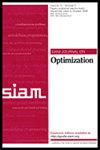基于随机字典的自适应阶跃搜索的高概率复杂性边界
IF 2.3
1区 数学
Q1 MATHEMATICS, APPLIED
引用次数: 0
摘要
SIAM 优化期刊》,第 34 卷第 3 期,第 2411-2439 页,2024 年 9 月。 摘要我们考虑了一种随机环境下连续优化的阶跃搜索方法,在这种环境下,函数值和梯度只能通过不精确的概率零阶和一阶奥拉茨获得。(我们引入阶跃搜索这一术语来表示一类方法,与直线搜索类似,但在回溯过程中阶跃方向会发生变化)。与随机梯度法及其多种变体不同,该算法不使用预先设定的步长序列,而是根据算法的估计进度自适应地增减步长。这些算法能捕捉到多种标准设置,包括预期损失最小化和零阶优化。此外,我们的框架非常通用,允许函数和梯度估计有偏差。所提出的算法描述简单,易于实现。在相当宽泛的算法条件下,当算法应用于非凸、凸和强凸(更一般地说,满足 Polyak-Łojasiewicz (PL) 条件的函数)函数时,我们得出了算法迭代复杂度的高概率尾界。我们的分析加强并扩展了先前关于随机步长和直线搜索方法的结果。本文章由计算机程序翻译,如有差异,请以英文原文为准。
High Probability Complexity Bounds for Adaptive Step Search Based on Stochastic Oracles
SIAM Journal on Optimization, Volume 34, Issue 3, Page 2411-2439, September 2024.
Abstract. We consider a step search method for continuous optimization under a stochastic setting where the function values and gradients are available only through inexact probabilistic zeroth- and first-order oracles. (We introduce the term step search for a class of methods, similar to line search, but where step direction can change during the back-tracking procedure.) Unlike the stochastic gradient method and its many variants, the algorithm does not use a prespecified sequence of step sizes but increases or decreases the step size adaptively according to the estimated progress of the algorithm. These oracles capture multiple standard settings including expected loss minimization and zeroth-order optimization. Moreover, our framework is very general and allows the function and gradient estimates to be biased. The proposed algorithm is simple to describe and easy to implement. Under fairly general conditions on the oracles, we derive a high probability tail bound on the iteration complexity of the algorithm when it is applied to nonconvex, convex, and strongly convex (more generally, those satisfying the Polyak-Łojasiewicz (PL) condition) functions. Our analysis strengthens and extends prior results for stochastic step and line search methods.
Abstract. We consider a step search method for continuous optimization under a stochastic setting where the function values and gradients are available only through inexact probabilistic zeroth- and first-order oracles. (We introduce the term step search for a class of methods, similar to line search, but where step direction can change during the back-tracking procedure.) Unlike the stochastic gradient method and its many variants, the algorithm does not use a prespecified sequence of step sizes but increases or decreases the step size adaptively according to the estimated progress of the algorithm. These oracles capture multiple standard settings including expected loss minimization and zeroth-order optimization. Moreover, our framework is very general and allows the function and gradient estimates to be biased. The proposed algorithm is simple to describe and easy to implement. Under fairly general conditions on the oracles, we derive a high probability tail bound on the iteration complexity of the algorithm when it is applied to nonconvex, convex, and strongly convex (more generally, those satisfying the Polyak-Łojasiewicz (PL) condition) functions. Our analysis strengthens and extends prior results for stochastic step and line search methods.
求助全文
通过发布文献求助,成功后即可免费获取论文全文。
去求助
来源期刊

SIAM Journal on Optimization
数学-应用数学
CiteScore
5.30
自引率
9.70%
发文量
101
审稿时长
6-12 weeks
期刊介绍:
The SIAM Journal on Optimization contains research articles on the theory and practice of optimization. The areas addressed include linear and quadratic programming, convex programming, nonlinear programming, complementarity problems, stochastic optimization, combinatorial optimization, integer programming, and convex, nonsmooth and variational analysis. Contributions may emphasize optimization theory, algorithms, software, computational practice, applications, or the links between these subjects.
 求助内容:
求助内容: 应助结果提醒方式:
应助结果提醒方式:


